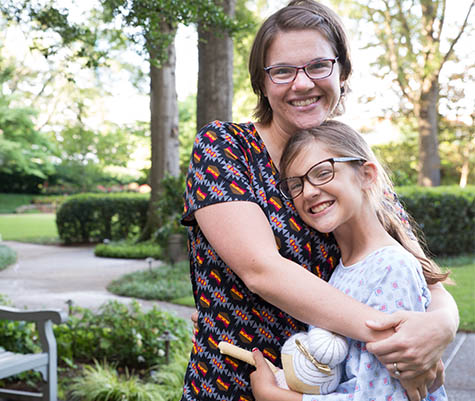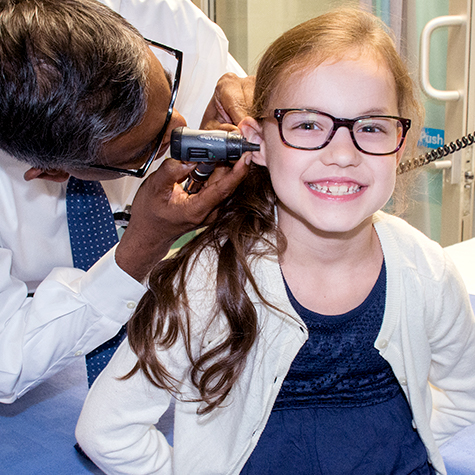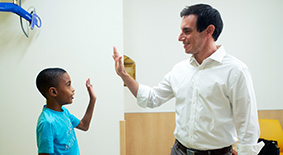Inflammatory bowel disease (IBD) is a chronic (long-lasting) disorder that causes inflammation in the small and large intestines. It is one of the most common chronic diseases among children and teenagers, affecting an estimated 4 in 1,000 children. Two of the most common types of IBD are Crohn’s disease and ulcerative colitis. Because Crohn’s disease and ulcerative colitis are so similar, they are collectively referred to as IBD.
What is Crohn’s disease?
Crohn’s disease is a recurring inflammatory disease of the GI tract. Symptoms include pain in the abdomen, bloating, diarrhea and fever. Patients often notice these symptoms between the ages of 15 and 25.
What is ulcerative colitis?
Ulcerative colitis is an inflammatory disease of the GI tract that’s characterized by the ulcers that form on the innermost lining of the colon. Symptoms include diarrhea, blood or mucus in the stool, fatigue, loss of appetite and weight loss. Patients may also experience fever or anemia.

Check out these helpful IBD resources for patients and parents.
At Children's Healthcare of Atlanta, we offer some of the country’s top treatments for children and teens who suffer from Crohn's disease, ulcerative colitis and indeterminate colitis. To help us determine the right diagnosis and develop the best treatment plan for your child, our team of pediatric-trained specialists may perform one or more of the following tests:
- EGD and colonoscopy
- Stricture dilation
- Video capsule endoscopy
- Magnetic resonance endoscopy
- Single balloon enteroscopy
Delivering more reliable and proactive care
In addition to exceptional clinical care, our doctors are active in the research community. Our team of pediatric gastroenterologists actively participate in the ImproveCareNow network, one of the leading learning health networks in the U.S. and around the world. Gastroenterologists, clinicians, researchers, parents and families from all participating centers collaborate to help improve the care and health of children and teens who have been diagnosed with Crohn’s disease and ulcerative colitis.
For decades, there have been no significant improvements in remission rates for patients with IBD. ImproveCareNow has helped change that. Since the network was established, the percentage of registered patients with Crohn’s disease and ulcerative colitis who are in remission has increased from 50 percent to 77 percent. ImproveCareNow provides tools and support that our team at Children’s uses to deliver more reliable and proactive care for your child.

Genetic testing leads to cure for Tripp’s Crohn’s Disease
Using genetic testing, Dr. Kugathasan was able to determine the best treatment to cure Tripp's Crohn’s disease.
Read more
Dr. Kugathasan leads research effort to combat pediatric Crohn’s disease.
Crohn’s disease affects about half a million people in the U.S., including 100,000 children. Subra Kugathasan, MD, Pediatric Gastroenterologist at Children's, is studying environmental factors, including diet, to determine their potential role in this disease and to help children like Evelyn.
Read moreWe understand that when it comes to your child, a second opinion can help ease concerns and help you make an informed decision. We welcome all second opinions. The IBD Second Opinion Program at Children's can be particularly helpful to:
- Children with IBD who fail to respond to conventional treatment approaches or require long-term steroid therapy.
- Children who may benefit from new treatment therapies.
- Children with delayed growth or sexual development.
- Parents who need advice about whether their children need surgical intervention.
About Our IBD Second Opinion Program
Our IBD Second Opinion Program is led by Subra Kugathasan, MD, a Pediatric Gastroenterologist at Children’s and a nationally recognized expert in the field of pediatric IBD. Dr. Kugathasan, along with our other IBD experts, is actively involved in various research studies and clinical trials to better understand the causes of IBD and seek new treatments.
Some of these studies include:
- A large national risk-stratification project
- Studies that examine the genetics of IBD
- Evaluation of medical imaging of patients with IBD
Some of our research efforts may align with your child’s needs. A second opinion could provide access to advanced treatments and medicines—in place of surgery.
What to Expect During Your Child’s IBD Second Opinion Consult
At Children’s, we offer a thorough evaluation by a team of experts, including physicians, nutritionists, radiologists and a psychologist. Most children are seen at the Center for Advanced Pediatrics in Atlanta and do not require a hospital admission for the consult. Visits usually take two days, but in some cases, the exam can be finished in one day.
Your child’s appointment will include:
- Thorough consultation from one or more of our specialists
- Possible esophagogastroduodenoscopy (EGD) and colonoscopy
- Possible other studies, such as an MRI or video capsule endoscopy, which may be necessary to evaluate the extent of small bowel Crohn’s disease
- Nutritional assessments are also performed to help manage short-term macro- and micro-nutritional needs and to help prevent long-term complications, such as osteoporosis. In addition, psychological assessments are available when requested.
All of our findings will be shared with you, your child’s primary care physician and your child’s gastroenterologist. This helps make sure your child gets the comprehensive care needed when you return home.
While all of our pediatric gastroenterologists treat children and teens with IBD, the following providers specialize in caring for children with IBD:
- Subramaniam Kugathasan, MD, Scientific Director, IBD
- Joanna Niklinska-Schirtz, MD
- Chathruckan Rajendra, MD
- Cary G Sauer, MD, Division Chief, Gastroenterology, Hepatology and Nutrition
- Michelle Dinser, CPNP
Outpatient visits and most IBD Second Opinion Program consults will be conducted in our clinic at the Center for Advanced Pediatrics. If your child needs to be admitted to the hospital, he will go to Arthur M. Blank Hospital.
Center for Advanced Pediatrics
2174 North Druid Hills Road NE
Atlanta, GA 30329
Arthur M. Blank Hospital
2220 N Druid Hills Rd NE
Atlanta, GA 30329
Children's Physician Group Resources
Contact Us 404-785-KIDS (5437)



